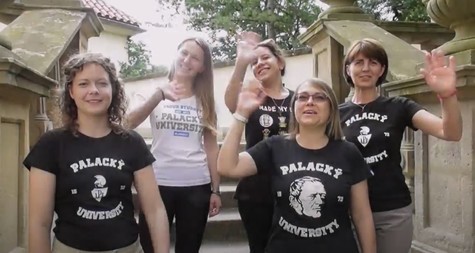Application form
Computer in Everyday Use and a little bit of Python
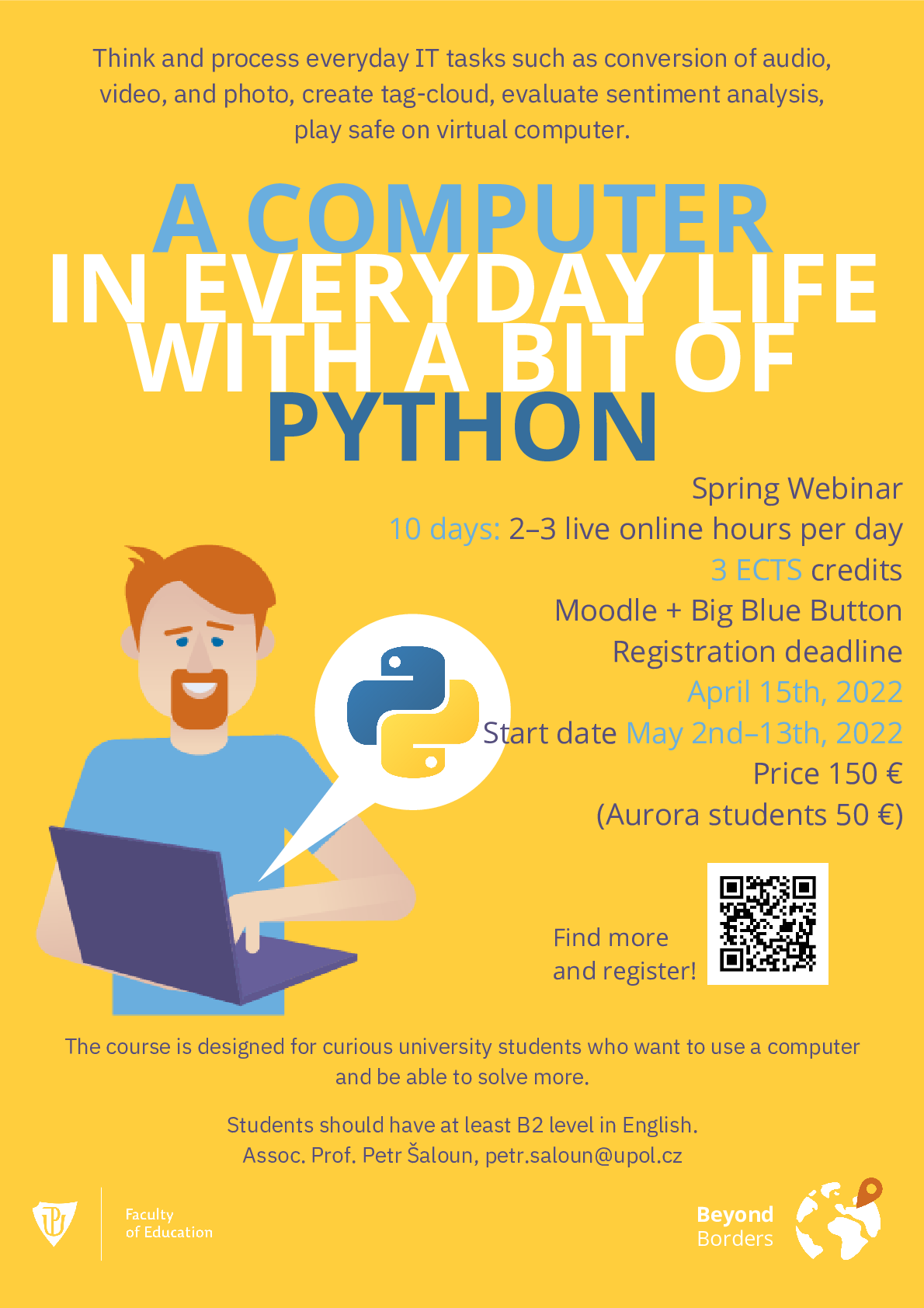
INTENSIVE WEBINAR ANNOTATION
Title: Computer in Everyday Use and a little bit of Python
The webinar is multi-thematic and the selected topics are practically applicable and represent learning with the solution of case studies. Usually we will use instructions and code for the python programming language and we will call ready-made freely distributable programs as practical tools for performing the required actions.
You will learn to transform audio, video and photos between their different formats (mp4, mkv, flac, mp3, JPG, PNG) in different resolutions / quality and with different compression, just like you can download them from youtube and other servers and you need them in another format or quality. You will try creating a very simple graphical user interface for it in a simple editor. You will create your own installation of Windows in a virtual machine, so you will be independent of the version and type of operating system available to you. You will also learn how to install a Linux distribution in virtual environment and how to set up virtual Python environment with data-science-proven tool called Jupyter notebook. We will process texts in natural language (downloaded, for example, from the web) in two ways (Google Cloud Platform and own Python code) and create attractive tag-clouds and similar analyzes that will help better understand the content and categories of documents, moods (sentiment) of users and their contributions. We will guide you through the basic means of programmable web scrapping in order to collect own data set for further analysis. This hands-on lesson will also strengthen you Python coding skills. You will also get your hands on stock time series, their tabular processing and visualization. We will attempt to find their correlation with Twitter sentiment in order to make some stock predictions with help of historical data and current tweets. We will also take a look on a work with large data sets and their aggregated visualization in both easy (using tools like Tableau) and hard way (own Python code). With this arsenal, you will be able to easily visualize everything from world-wide attacks on your server to a pandemic heat map.
Team of lecturers:
doc. RNDr. Petr Šaloun, Ph.D., Palacký University in Olomouc, Czech Republic
Mgr. Lucie Bryndová, Palacký University in Olomouc, Czech Republic
Ing. David Andrešič, VSB - Technical University of Ostrava , Czech Republic
Start date May 2nd – May 13th, 2022
Course assessment: 3 ETC credits
The deadline for the applications is 15th April 2022.
The price of the webinar is 150 Euro.
The price for Aurora students is 50 Euro.
The webinar will take place only in the case of minimally 6 applicants.
You will be informed when to pay in May.
For more information regarding the online Winter Webinar please contact petr.saloun@upol.cz
Diversity in the School Environment
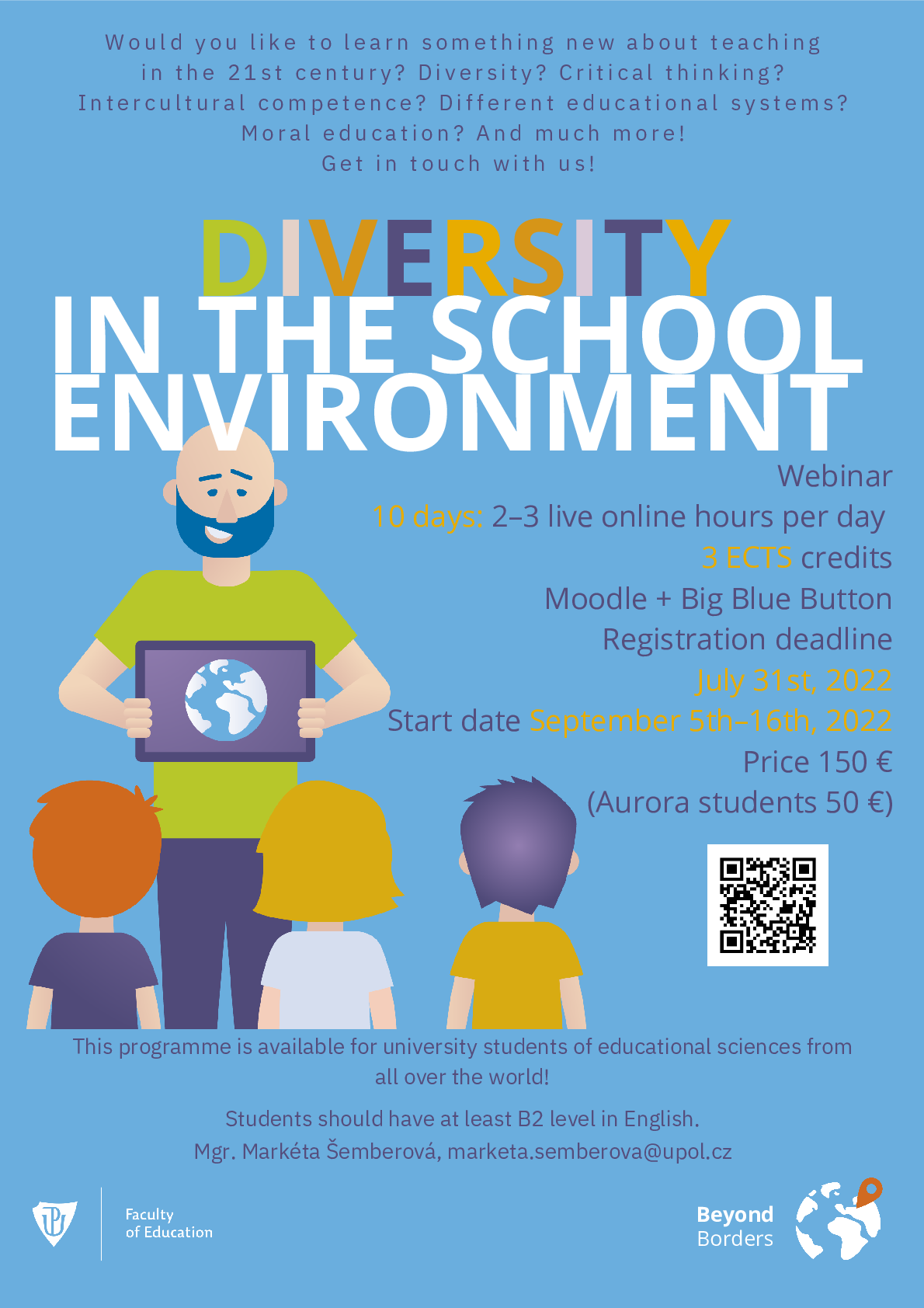
INTENSIVE WEBINAR ANNOTATION
Title: Diversity in the school environment and relation to critical thinking
Diversity in the school environment and the relationship to critical thinking is a two-week intensive course designed for foreign students who want to acquire or deepen their knowledge and enrich themselves with skills in the field of diversity in the school environment. During this two-week course, participants will be introduced to basic concepts related to diversity in the school environment, learn and practice many activities aimed at enriching participants not only personally but also professionally, and participate in many discussions on various related topics. The total course consists of 28 hours of direct teaching and practical training and activities.
Webinar objectives:
General: After completing the entire course, students will be equipped with the necessary knowledge of theory, practical skills and attitudes that are key to teaching or interacting in a diverse environment. Students will complete this course on the Moodle platform and the Big Blue Button which will be used as a platform for online teaching.
Students will be able to:
• define and explain 21st century skills,
• explain moral education and work with social conventions and personal domains,
• understand the essence of critical thinking, recognize personal strategies and skills related to critical thinking, integration of critical thinking into curriculum,
• describe distinctions among assessments, tests, measurements and evaluations and understand three types of assessment and approaches to diagnosis of learning problems,
• characterize, identify and analyze mistakes, shortcomings and barriers they can encounter in social communication,
• understand existing models of intercultural competence and see how subjective perspective influences understanding of intercultural competence,
• understand different minorities, their characteristics and learn how to work with pupils with different mother tongue,
• learn about different school systems,
• understand the essence of main principles of reform pedagogy and explain different approaches.
Topics:
1) Teaching in the 21st century,
2) Moral and value education in the school context,
3) Productive school environment,
4) Critical thinking as a skill for the 21st century,
5) Pedagogical diagnostics,
6) Communication and soft skills,
7) How to become interculturally competent?
8) Pupil with different mother tongue,
9) Comparative pedagogy,
10) International and Czech reform pedagogy
Team of lecturers:
Mgr. Markéta Šemberová, Palacký University in Olomouc, Czech Republic
PaedDr. Alena Jůvová, Ph.D., Palacký University in Olomouc, Czech Republic
Mgr. Adéla Antlová, Palacký University in Olomouc, Czech Republic
Mgr. Iva Koribská, Palacký University in Olomouc, Czech Republic
Danping Peng, Ph.D., Palacký University in Olomouc, Czech Republic
Mgr. Tereza Buchtová, Ph.D., Palacký University in Olomouc, Czech Republic
PhDr. Jitka Plischke, Ph.D., Palacký University in Olomouc, Czech Republic
Dr. Vana Chiou, Department of Geography, University of the Aegean, Greece
Associate professor Lilia Andrea Teruggi, University of Milano-Bicocca, Italy
Associate professor Franca Zuccoli, University of Milano-Bicocca, Italy
Course assessment: 3 ETC credits
Requirements in order to receive the credits:
• Active participation in the minimum of 80% of lessons,
• Submitting at least 70% of tasks and answers to questions in Moodle,
• Successful completion of the test (the limit for granting credits is 70% of correct answers)
Start date September 5th – September 16th, 2022
The deadline for the applications is 30th July 2022.
The price of the webinar is 150 Euro.
The price for Aurora students is 50 Euro.
The webinar will take place only in the case of minimally 6 applicants.
You will be informed when to pay in August.
For more information regarding the online Winter Webinar please contact marketa.semberova@upol.cz
Practical English Language Skills for the 21st Century (Advanced speaking, listening and writing)
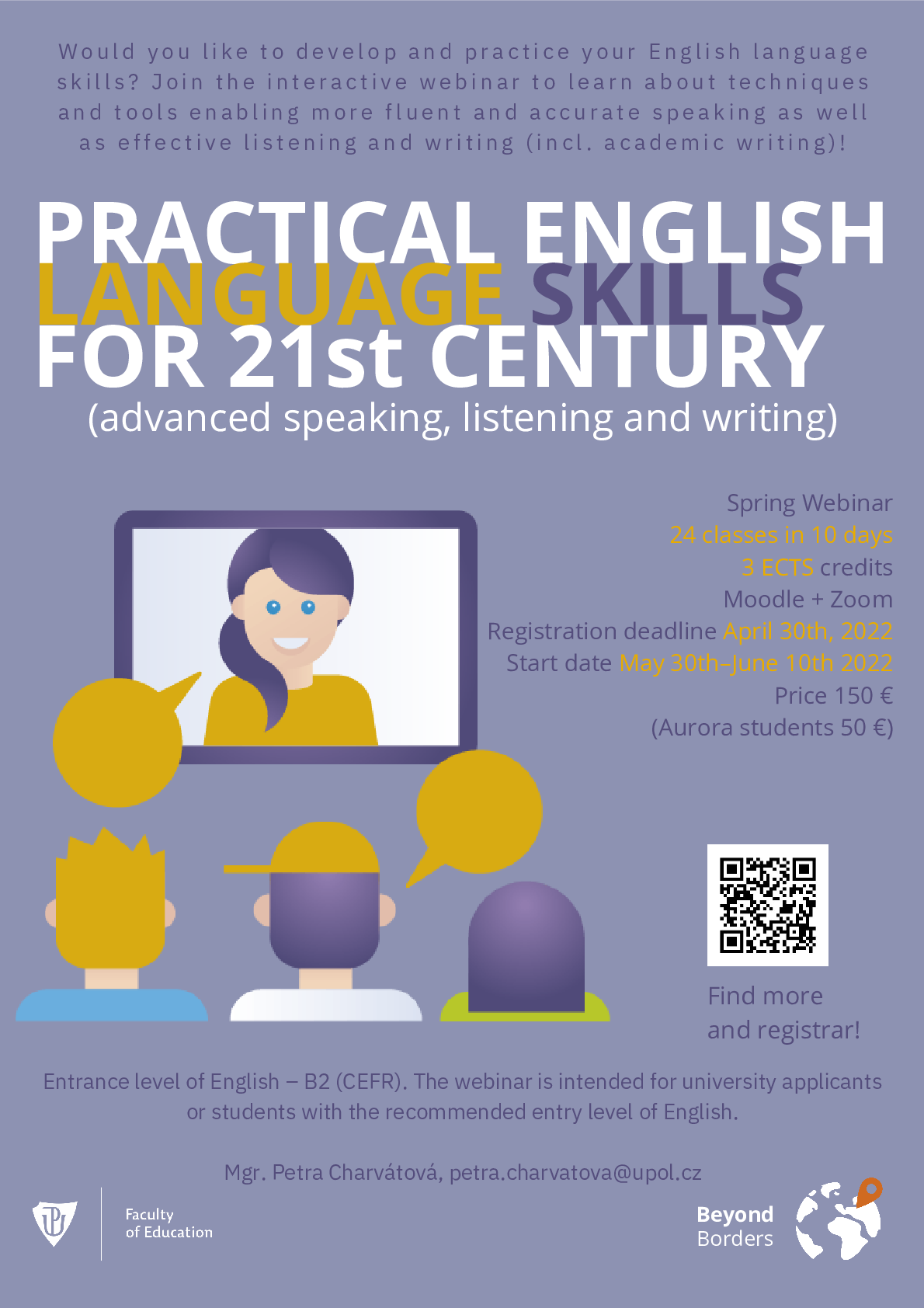
INTENSIVE WEBINAR ANNOTATION
Title: Practical Language Skills for the 21st Century (Advanced speaking, listening and writing)
Target audience:
The webinar is intended for university applicants or students with the recommended entry level of English (B2 CEFR) who aim to improve their competences in the areas of speaking, listening and writing.
Annotation:
The webinar aims to develop and promote participants’ speaking, listening and writing skills towards the advanced level (C1 CEFR). This practical course is highly interactive and makes use of modern online ELT tools (e.g. Quizlet, Wordwall). It will be taught by experienced lecturers from the Pedagogical faculty including an English native speaker. The results will be assessed by written tests, and individual evaluation of participants’ performance.
The webinar is comprised of a Speaking, Listening and Writing module, detailed below.
a) Speaking module (Mgr. Petra Charvátová)
Aims: To enhance participants’ speaking fluency and accuracy; to expand their vocabulary and enlarge the range of grammatical resources; to promote skills involved in presenting an argument and discussing a range of general topics.
Topics: Expressing preferences and giving reasons, Evaluating and suggesting, Expressing possibility and hypothesis, Speculating, Reaching a decision, Managing interaction.
Methods: Speaking practice, discussion
b) Listening module (Mgr. Ruth Valentová, PhD.)
Aims: Training of audio-oral skills in English with a focus on increasing the level of listening skills. Development of language reception and production. Expansion and systematization of vocabulary. Listening skills training at the C1 level. Introduction to basic principles and acquisition of effective listening comprehension techniques.
Activities:
• Listening focused on understanding the main ideas (open-ended questions)
• Listening focused on arranging information (ordering).
• Listening focused on understanding specific data (open-ended questions).
• Listening focused on understanding a lecture. Recording the main points, creating notes (note taking).
• Listening aimed at identifying specific information from multiple-choice answers (multiple choice).
Methods: Reading, briefing; Discussion, interview, brainstorming; Methods of working with text / listening material.
c) Writing Module (Mgr. Petr Anténe, M.A., Ph.D.)
Aims: Extension of active and passive vocabulary in the context of different functional styles, distinguishing informal vocabulary from phrases and sentence structures used in written formal communication.
Activities: Categorization of didactic and authentic study materials into the appropriate functional style, identification of formal and informal elements in a specific text and subsequent creation of a similar text (email, C.V.).
Methods: Learning from students’ own mistakes, peer review.
+ Academic writing mini-module
Team of lecturers:
Mgr. Petra Charvátová, Palacký University in Olomouc, Czech Republic
Mgr. Petr Anténe, M.A., Ph.D., Palacký University in Olomouc, Czech Republic
Mgr. Ruth Valentová, PhD., Palacký University in Olomouc, Czech Republic
Pierce Mountney, B.A.., Palacký University in Olomouc, Czech Republic
Jeffrey Keith Parrott, Ph.D. - Tomas Bata University in Zlín, Czech Republic
Start date May 30th - June 10th, 2022
Course assessment: 3 ETC credits
The deadline for the applications is 30th April 2022.
The price of the webinar is 150 Euro.
The price for Aurora students is 50 Euro.
The webinar will take place only in the case of minimally 6 applicants.
You will be informed when to pay in August.
For more information regarding the online Winter Webinar please contact petra.charvatova01@upol.cz
Creative Ways to Reflect and Foster Teacher´s Personality
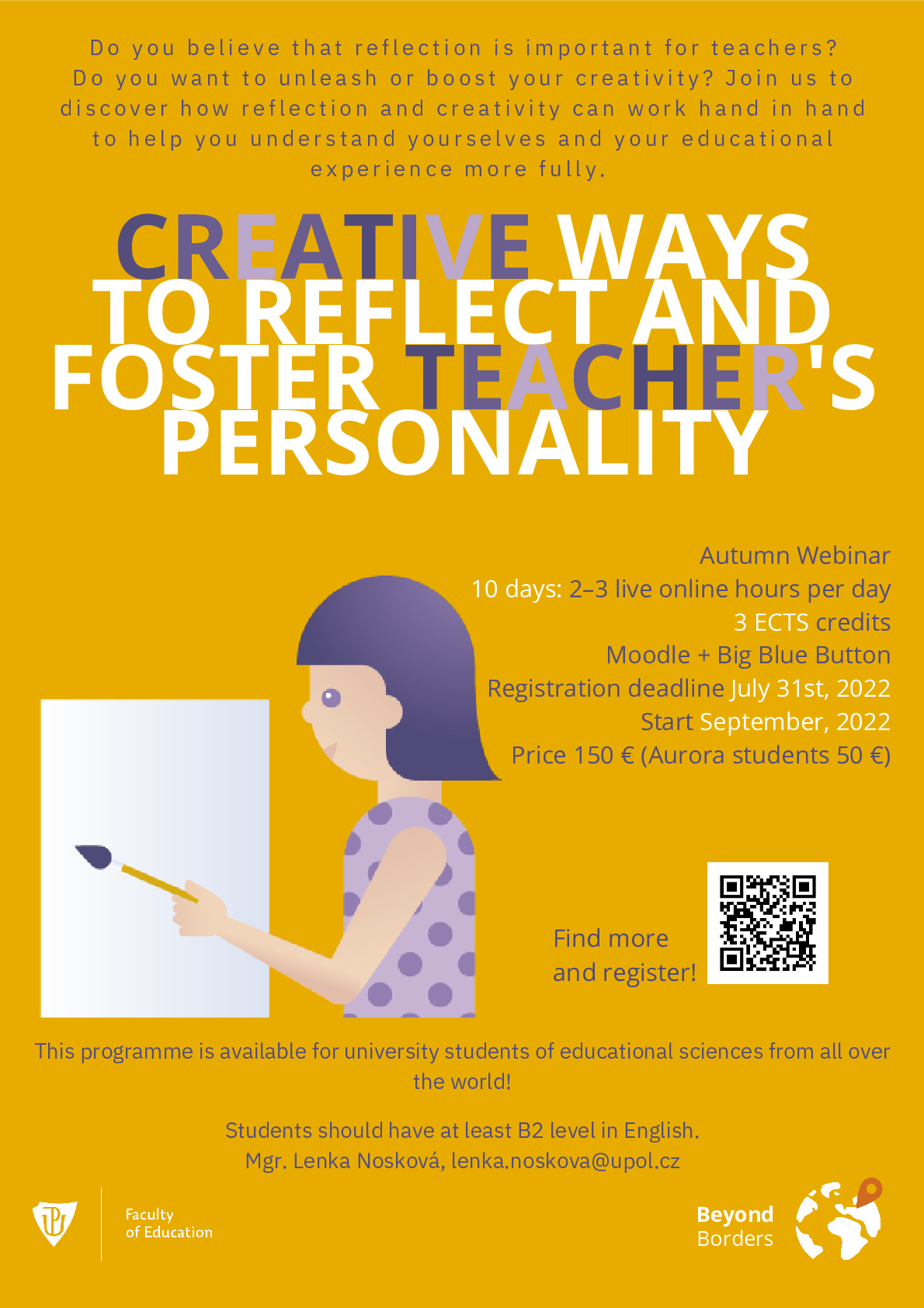
INTENSIVE WEBINAR ANNOTATION
Title: Creative ways to reflect and foster teacher´s personality
Traditionally, teacher training programmes focused primarily on providing detailed subject knowledge and acquainting the students with a wide range of teaching methods. While the role of teacher´s personality in the educational process has been fully acknowledged, it is now becoming more and more recognized that the successful careers of novice teachers is also influenced by the quality of their self-awareness. Reflection, a process of introspection and self-evaluation, is a key element in every profession where one needs to learn from experience flexibly and continuously. We believe that introducing teacher candidates to a number of creative methods of reflection will help them to begin their future career in education in a more focused mindful way.
Webinar objectives:
General: to create a space for education students in which they will be encouraged to actively explore their motivation, ideas, beliefs and visions related to their future teaching careers by means of various techniques of reflection.
Specific:
- to help the students better understand the role of teacher´s personality as an essential element in the educational process,
- to help the students realize how their past experience as participants in the educational process might have shaped their attitudes to education and teaching,
- to raise students´ awareness of the importance of introspection as a means to understand one´s strong points and limitations related to their future teaching career,
- to help students deepen their understanding of creativity and critical thinking and their potential for supporting introspection,
- to acquaint the students with various techniques suitable for reflecting on personal/professional issues, ranging from techniques based on creative visual arts, creative verbal expression, methods of critical thinking, to methods experimenting with physical expression,
- to guide the students in applying selected reflective techniques to their own (educational) experiences,
- to help students become more consciously aware of their identity as future teachers.
Topics:
- The role of personal educational experience.
- Important aspects of teacher´s personality.
- The role and the process of reflection.
- Creativity and its potential for reflection.
- Reflection through various forms of visual arts.
- Reflection through creative use of language.
- Reflection through observing and interacting with environment.
- Reflection through drama.
- Non-verbal communication and stress management.
- Reflection through methods of critical thinking.
Team of lecturers:
Melanie Reaves, Ph.D., Montana State University, USA
Dr. Karen Ventura-Kalen, Ph.D., University of Wyoming, USA
Mgr. Jana Kořínková, Ph.D., Faculty of Education, Palacký University, Czech Republic
Mgr. Lenka Nosková, Faculty of Education, Palacký University, Czech Republic
doc. PhDr. Eva Maria Hrdinová, Ph. D. Faculty of Education, Palacký University, Czech Republic
doc. Mgr. Silvie Válková, Ph.D., Philosophical Faculty, Palacký University, Czech Republic
Mgr. Barbora Bačíková, Faculty of Education, Palacký University, Czech Republic
Course assessment: 3 ETC credits
Requirements in order to receive the credits:
- Active participation in the minimum of 80% of lessons
- Submitting 6 or more practical tasks based on creative activities introduces in lessons
- Submitting 3 or more commented quotations from texts provided for background reading
- Submitting final reflection (300 words)
Start date September 2022
The deadline for the applications is 31st July 2022.
The price of the webinar is 150 Euro.
The price for Aurora students is 50 Euro.
The webinar will take place only in the case of minimally 6 applicants.
You will be informed when to pay in September.
For more information regarding the online Winter Webinar please contact lenka.noskova@upol.cz
Czech and US team members
